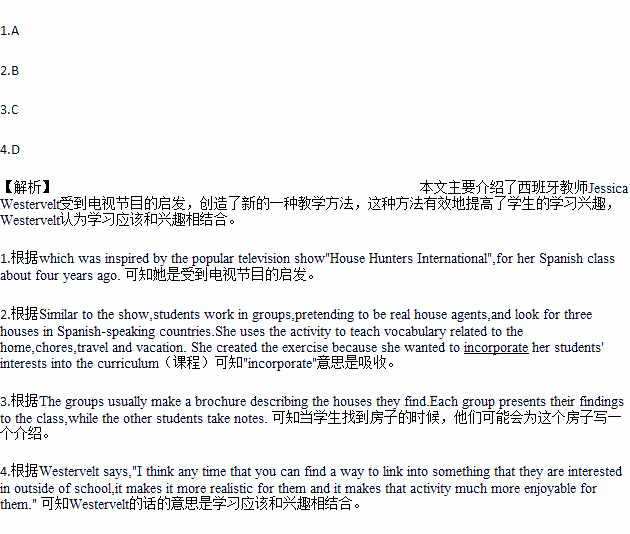题目内容
Jessica Westervelt,a Spanish teacher at Bethlehem High School in New York,created an activity called “House Hunters”,which was inspired by the popular television show “House Hunters International”,for her Spanish class about four years ago.
Similar to the show,students work in groups,pretending to be real house agents,and look for three houses in Spanish-speaking countries.She uses the activity to teach vocabulary related to the home,chores,travel and vacation.She created the exercise because she wanted to incorporate her students’ interests into the curriculum.At the time,a group of her students were big fans of the show.
The students look for a house for Westervelt to buy to live in,or rent for vacation.She tells them what she is looking for in a home and gives them a budget.Students work in groups of three,and each student is responsible for finding one house in a Spanish-speaking country that fits the requirements.
The groups usually make a brochure describing the houses they find.Each group presents their findings to the class,while the other students take notes.The entire activity is done in Spanish,so students get to practice their writing,listening and conversation skills.They also get some cultural education when researching homes in Spanish-speaking countries.Westervelt says that students planning to take the class look forward to her project.
Westervelt says,“I think any time that you can find a way to link into something that they are interested in outside of school,it makes it more realistic for them and it makes that activity much more enjoyable for them.”
1.How did Westervelt come up with the idea of the activity?
A. She got it from a TV program. B. She was inspired by her students.
C. She learned it from a house agent. D. She was taught that in high school.
2.Which of the following can replace the underlined word “incorporate” in Paragraph 2?
A. change B. absorb
C. force D. persuade
3.What are the students supposed to do with the houses they find?
A. Rent the houses for their vacation. B. Live in the houses for a while.
C. Write an introduction to the houses. D. Choose and buy one for their teacher.
4.What do Westervelt’s words in the last paragraph mean?
A. Most school activities are not enjoyable.
B. Students should be realistic about study.
C. Out-of-school activities are very important.
D. Learning should be combined with interest.
 同步练习河南大学出版社系列答案
同步练习河南大学出版社系列答案 同步练习西南师范大学出版社系列答案
同步练习西南师范大学出版社系列答案

 l watchers.
l watchers. old on to tradition,and this also 9..(silent) marks them out from “the rest”.However,as for William and Kate,the 10..(decide) to dress George in shorts is more likely down to tradition than a class issue.
old on to tradition,and this also 9..(silent) marks them out from “the rest”.However,as for William and Kate,the 10..(decide) to dress George in shorts is more likely down to tradition than a class issue.